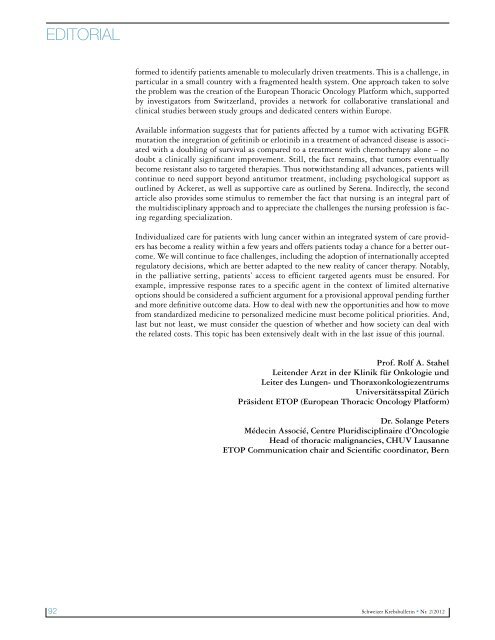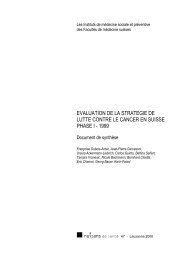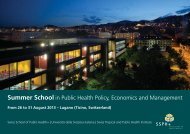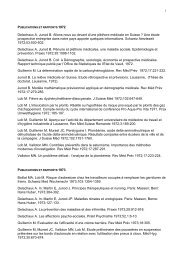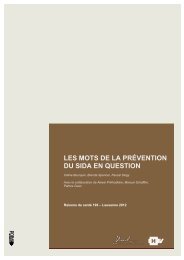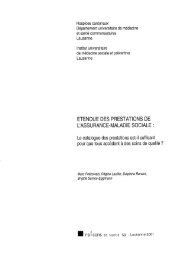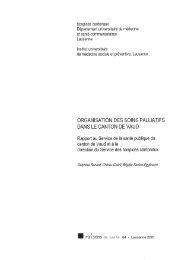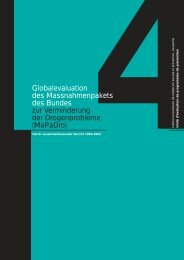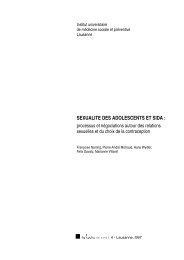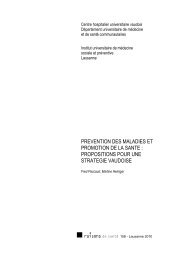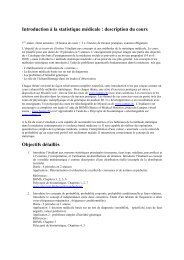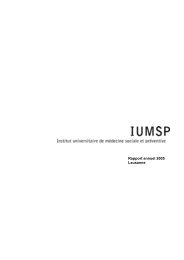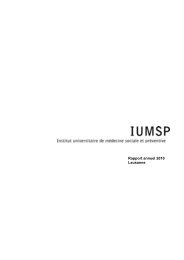Fortbildungen / Formations continues 2012 - IUMSP
Fortbildungen / Formations continues 2012 - IUMSP
Fortbildungen / Formations continues 2012 - IUMSP
Sie wollen auch ein ePaper? Erhöhen Sie die Reichweite Ihrer Titel.
YUMPU macht aus Druck-PDFs automatisch weboptimierte ePaper, die Google liebt.
EDITORIAL<br />
formed to identify patients amenable to molecularly driven treatments. This is a challenge, in<br />
particular in a small country with a fragmented health system. One approach taken to solve<br />
the problem was the creation of the European Thoracic Oncology Platform which, supported<br />
by investigators from Switzerland, provides a network for collaborative translational and<br />
clinical studies between study groups and dedicated centers within Europe.<br />
Available information suggests that for patients affected by a tumor with activating EGFR<br />
mutation the integration of ge�tinib or erlotinib in a treatment of advanced disease is associated<br />
with a doubling of survival as compared to a treatment with chemotherapy alone – no<br />
doubt a clinically signi�cant improvement. Still, the fact remains, that tumors eventually<br />
become resistant also to targeted therapies. Thus notwithstanding all advances, patients will<br />
continue to need support beyond antitumor treatment, including psychological support as<br />
outlined by Ackeret, as well as supportive care as outlined by Serena. Indirectly, the second<br />
article also provides some stimulus to remember the fact that nursing is an integral part of<br />
the multidisciplinary approach and to appreciate the challenges the nursing profession is facing<br />
regarding specialization.<br />
Individualized care for patients with lung cancer within an integrated system of care providers<br />
has become a reality within a few years and offers patients today a chance for a better outcome.<br />
We will continue to face challenges, including the adoption of internationally accepted<br />
regulatory decisions, which are better adapted to the new reality of cancer therapy. Notably,<br />
in the palliative setting, patients’ access to ef�cient targeted agents must be ensured. For<br />
example, impressive response rates to a speci�c agent in the context of limited alternative<br />
options should be considered a suf�cient argument for a provisional approval pending further<br />
and more de�nitive outcome data. How to deal with new the opportunities and how to move<br />
from standardized medicine to personalized medicine must become political priorities. And,<br />
last but not least, we must consider the question of whether and how society can deal with<br />
the related costs. This topic has been extensively dealt with in the last issue of this journal.<br />
Prof. Rolf A. Stahel<br />
Leitender Arzt in der Klinik für Onkologie und<br />
Leiter des Lungen- und Thoraxonkologiezentrums<br />
Universitätsspital Zürich<br />
Präsident ETOP (European Thoracic Oncology Platform)<br />
Dr. Solange Peters<br />
Médecin Associé, Centre Pluridisciplinaire d’Oncologie<br />
Head of thoracic malignancies, CHUV Lausanne<br />
ETOP Communication chair and Scienti�c coordinator, Bern<br />
92 Schweizer Krebsbulletin � Nr. 2/<strong>2012</strong>


